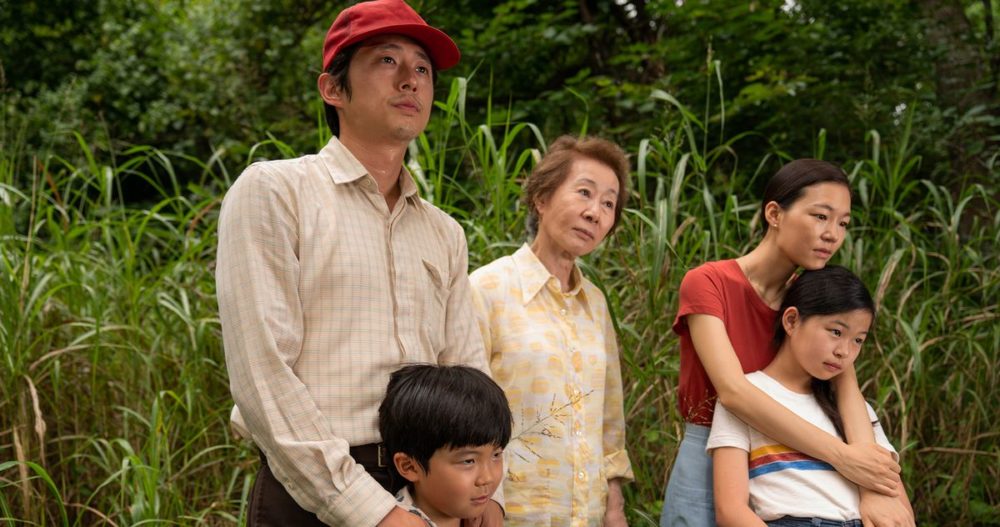
Minari tells the story of the Yi family, a Korean-American family that has moved from the city in California to a plot of land in rural Arkansas. The patriarch Jacob (Steven Yeun) is optimistic for the move and plans to grow fresh Korean produce and sell them to needy vendors in Dallas, Texas. His wife Monica (Han Ye-ri) and daughter Anne (Noel Kate Cho) on the other hand are disappointed by the move, being more accustomed to the conditions in the city as well as the increasing dangers of the health of their son David (Alan Kim), who is afflicted with a certain heart condition.
To navigate the new changes, Monica calls her mother Soon-ja (Youn Yuh-jung) from Korea to come over to Arkansas to watch over the children while she and Jacob are off to work in the hatchery, sexing chicks. Over time, the crops begin to grow, much to the satisfaction of Jacob and the dismay of the rest of the family. But, keeping the crops growing and stable is only one of the many challenges that the Yi family will go through in order to stay together.
Minari is directed by Korean-American filmmaker Lee Isaac Chung, who has gathered acclaim over the years from film festivals for his independent projects and documentaries. For his latest film, he has delved into his own past for inspiration (loosely) and has come up with one of the best films of the year to date.
Immersing the audience into the mindsets of both the optimism of Jacob and the wonder of David, writer/director Chung and cinematographer Lachlan Milne do a brilliant job in projecting warmth through light, hazy visual aesthetics and seamless camerawork. This is in contrast to the mindsets of Monica and Soon-ja, where the visual aesthetic simmers and becomes a bit grittier; grounding the proceedings in making the drama felt.
Chung never judges his characters for their actions and faults. He lends them a sense of empathy as they make rash decisions for the sake of success, and they all act in genuinely believable ways that are painfully real. In addition to Jacob, David has clearly acclimated to American traditions in ways that throw Soon-ja off i.e. drinking Mountain Dew which Soon-ja mistakes for water from the mountains and David having a different vision to what a grandmother should be like.
The difference in cultures also applies to how the Yi family acclimate to the Catholic religion, in which we see Paul (an enthusiastic Will Patton), a local man who is hired to help Jacob with the crops, come across as peculiar to Jacob and the children (barring Monica) as he preaches about God being a presence in his life with utmost zeal. Soon-ja also goes along with the family to church and starts stealing back money that the family chose to donate to the collection plate.
The differences are not played for melodramatic purposes, but they add a sense of friction, which further enhances the arcs of the characters, as well as some light comedy through the character reactions. It also helps that the cast chemistry is heart-warming and intimate, but never cloying. Yeun shows a deeper acting prowess in the role of Jacob, which he lends surprising depth and maturity never seen before in his earlier work. Considering that his proficiency in the Korean language has to be up to par as well, he pulls off a fantastic performance.
Han is fantastic as Monica, displaying both compelling vulnerability and inner fire as she struggles to keep herself and the family together, all while trying to bring her husband back down to Earth from his flights of fancy. Cho is also very good as Anne, as she has to force herself to essentially grow up and hold the family fort down. Meanwhile, Kim is marvellous as David; his sense of awe, precociousness and rambunctious presence is fun and simply lovely to watch.
Last but not least, Youn is a treasure here as Soon-ja. A veteran actress of both film and television, in this critic’s eyes, her work here is not surprising in how good it is. Lending much credibility to the drama with good-natured humour, her presence on-screen is just an absolute joy to watch. The bond she has with Kim is the true heart of the film.
Speaking of heart, the binding source of the film that keeps it all together is Chung’s shrewd use of water. Whether it is used to cultivate something (the crops), foreshadow character arcs (the difference in building the foundation of a well), lend a sense of friction (the false use of Mountain Dew) or even lend some comedy into the mix (the use of urine is hilariously infantile), the prominence of water makes the tone feel free-flowing in a positive manner.
That free-flowing tone is navigated smoothly thanks to the editing of Harry Yoon and especially thanks to composer Emile Mosseri. His score is strikingly melodic, such that the film reaches a certain ethereal, which brings credibility to the mindset of Jacob as he bridges the gap between his expectations and reality, as well as David’s gradual appreciation of nature as well as his grandmother. Taken alongside his work in the comedy-drama Kajillionaire, he is someone to look out for.
It is quite rare to see a film as wondrously comforting and familiar as this from America but Minari is exactly that; a brilliant family drama on acculturation that is affectively heartwarming, dramatically compelling and beautifully rewarding. Highly recommended.




![]()
FIVE STARS (OUT OF FIVE)
Minari is showing in cinemas now, courtesy of Madman.
